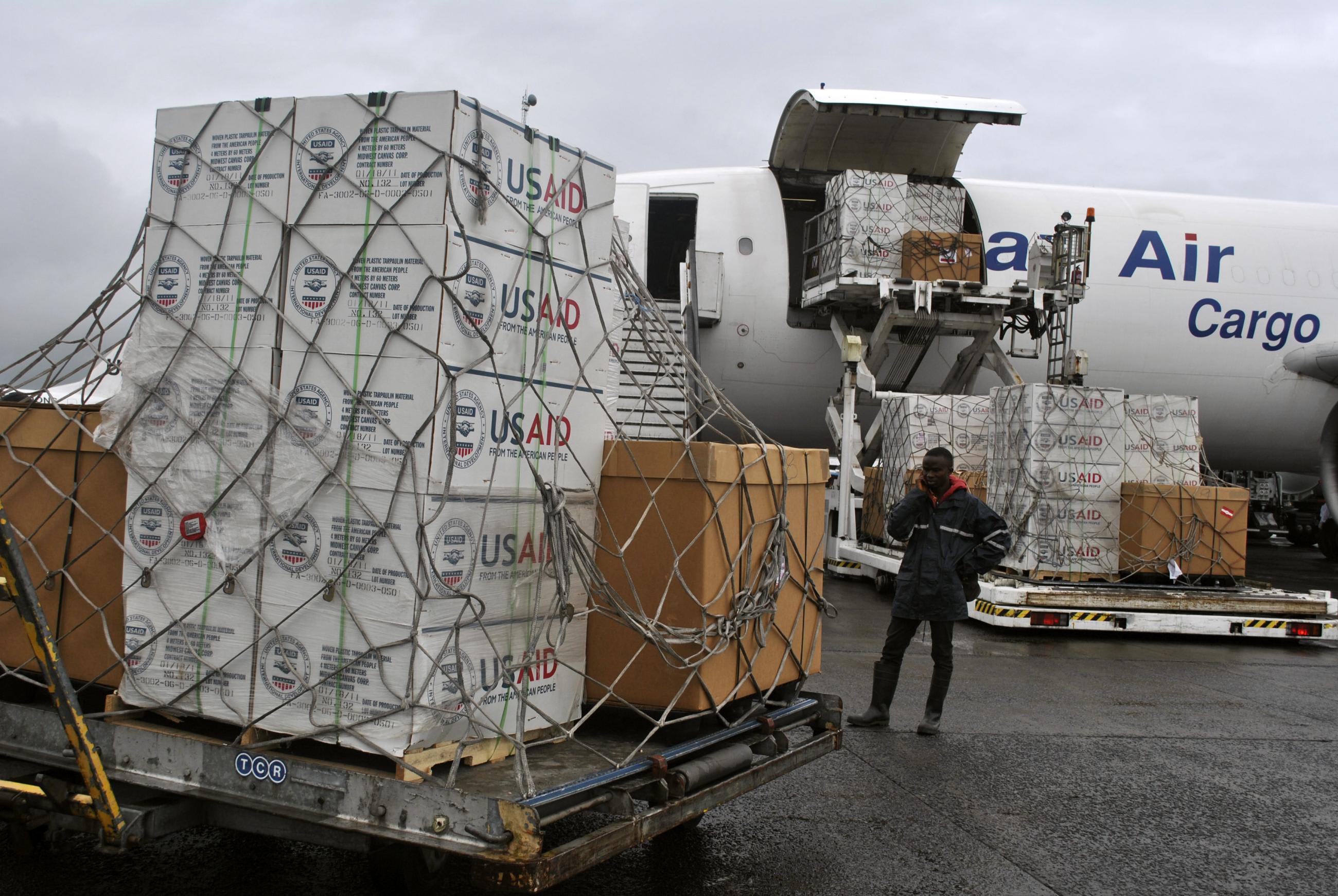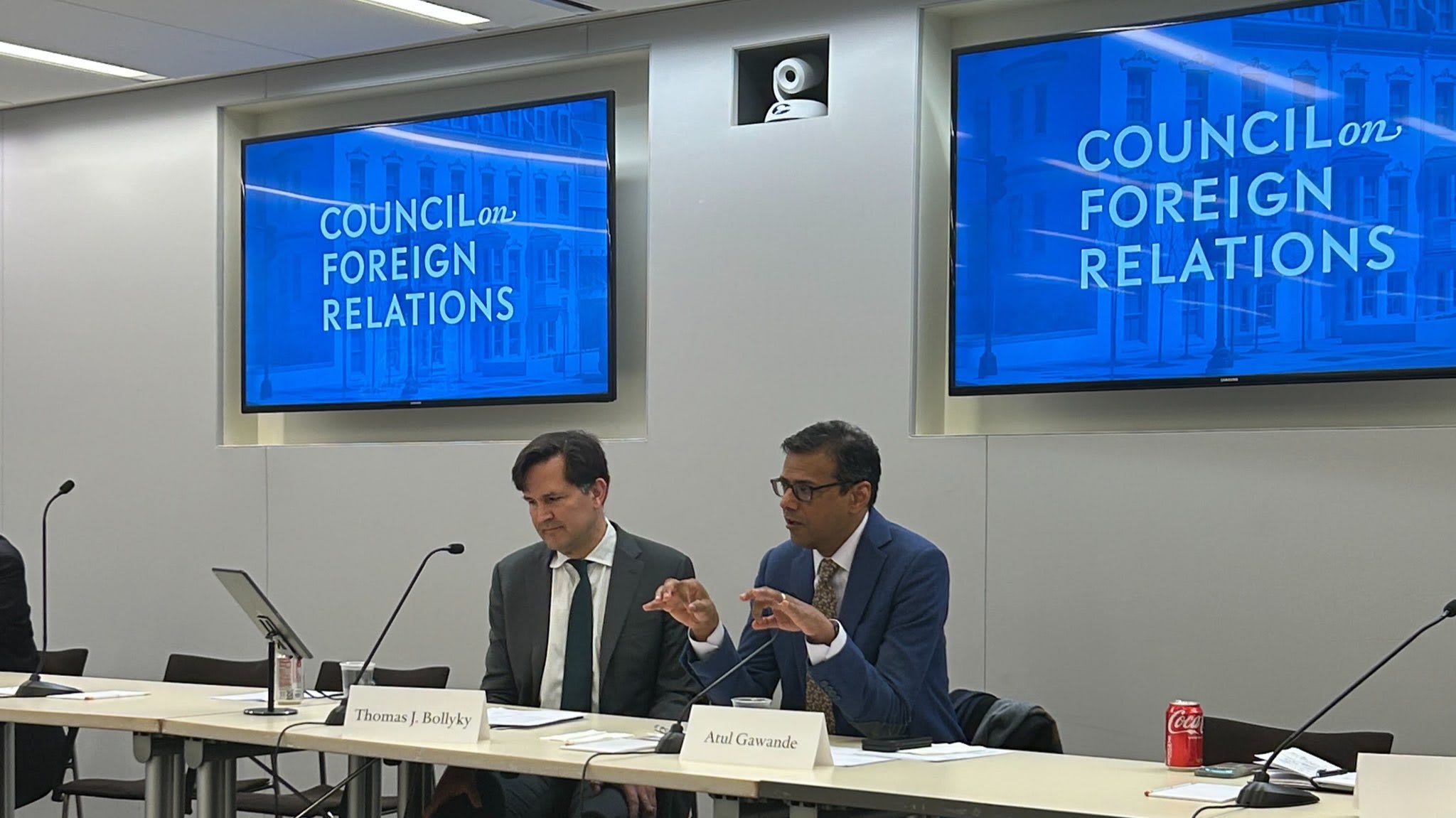On December 16, 2024, Assistant Administrator for Global Health at the U.S. Agency for International Development (USAID) Atul Gawande sat down with CFR's Thomas J. Bollyky for a wide-ranging conversation about global health's past and present. "One of the great thinkers, writers, and doers in global health," as Bollyky described him, Gawande has left an impressive mark on the global health community: Alongside his role at USAID, Gawande is a practicing surgeon, an entrepreneur, a columnist for the New Yorker, and the author of four New York Times best-selling books.
In conversation with Bollyky, Gawande drew on his past three years at USAID—"the best medical job in the government that no one's ever heard of," he called it—to highlight global health's most stunning accomplishments, describe the largest health threats the world faces, and outline future opportunities—including the use of artificial intelligence (AI)—to improve health and well-being on a global scale.
As the country nears the inauguration of a new president, the United States needs to take stock of global health's immense accomplishments and to chart a path for mitigating health threats both at home and abroad.
In his 2007 book Better, Gawande writes, "Better is possible. It does not take genius. It takes diligence. It takes moral clarity. It takes ingenuity. And above all, it takes a willingness to try."
Gawande's interview made it clear that the right investments, programs, and people have transformed health, economies, and life expectancy, but continuing that progress will require continued diligence from those in leadership.
How Far We've Come
According to Gawande, USAID was formed "to protect us from health threats from abroad and reduce the yawning—often unconscionable—inequities in life expectancy." In the decades following USAID's founding in 1961, the agency made impressive progress toward those goals.
The United States needs to take stock of global health's immense accomplishments and to chart a path for mitigating health threats
In 1980, having killed 300 to 500 million people over the course of the twentieth century, smallpox became the only disease to be eradicated. In 1990, child deaths numbered 93 per 1,000 live births globally. By 2022, they had plummeted by 60% to just 37 per 1,000. Several countries once considered low income have now "graduated" from assistance and achieved greater life expectancy. Investment in primary health care in countries such as Thailand has slashed premature mortality and improved care for noncommunicable diseases.
African economies in particular have grown substantially, which has bolstered African-led public health systems. That investment has translated to a "massive reduction in the time it takes to respond, to detect, respond and then contain Ebola and other viral hemorrhagic fever outbreaks."
In 2018, responding to Democratic Republic of Congo's (DRC's) Ebola cost $1 billion and claimed 2,200 lives. Now, during his role at USAID, Gawande recounted a suspected case of Ebola in DRC that was swiftly contained in a matter of days thanks to effective use of PPE, diagnostics, and a reporting system.
The recent rapid containment of Marburg virus in Rwanda also indicated how far African countries have come in containing outbreaks. Gawande praised the success of the experimental Marburg vaccine as well as ongoing efforts to boost regional manufacturing of other vaccines and diagnostic tests.
The benefit has been cyclical: Investments in health in turn have boosted economic growth for communities.
The Threats We Face
Gawande began his role at USAID in January 2022, when the agency's greatest goals were to control COVID-19 and prevent future health catastrophes. According to Gawande, "the post-pandemic period has been one of constant outbreaks."
Alongside 11 hemorrhagic fever outbreaks over the past four years, the world is facing a "huge volume of zoonotic diseases"—such as H5N1 and mpox—some with the potential to "devastate the agriculture industry." Respiratory pathogens such as H5N1, Gawande said, "represent a distinct threat" to humanity.
Addressing constant outbreaks will require investment in nonpharmaceutical measures, including masks and diagnostics, as well as sustained global vaccination. Unfortunately, the erosion in trust in public health following the pandemic threatens to stymy ongoing vaccination efforts. "Trust in institutions has eroded enormously for reasons that go well beyond health," Gawande noted.
He spoke with particular concern about attempts to "turn the world against the global health enterprise in fundamental ways." From July to December 2024, USAID tracked at least 81 foreign propaganda campaigns targeting its work in local languages in every region of the world. Using social media accounts, a website, and other digital tools, Russia's intelligence services spread "baseless claims" about USAID's global health work, including that the agency was carrying out biological testing on African communities.
According to Gawande, "This work is national security work. . . . We know how meaningful [it] is, not just from the impact, but also from how it is being targeted by foreign propaganda attacks." Investing in global health "strengthens alliances and our security in an age when so many of the biggest threats that we face, including emerging pathogens, transcend borders."
Drawing on his background in medicine, he described the need to build "immunity" to combat these threats:
I've come to think of . . . our work around global health security as the building of our global immune system. Our bodies have immune systems that rapidly detect threats, that are able to respond rapidly contain those threats. They actually get stronger as a result of building up a library of those responses and being able to use that template better and better. It's not just a resilient system, but it's an antifragile system, meaning that it gets stronger with each exposure. In a similar way, we're building a system [to address] the increasing, shape shifting, infectious threats that emerge and can spread anywhere in our tightly connected world.
Despite the strategic and humanitarian imperative of advancing global health, the work is under an increasing threat of losing funding. "Last year, we saw [the work we've built] get a 22% cut in its budget. It was never funded well enough that the United States would be able to do this work entirely ourselves. [It depends] on the domestic budgets in the countries we work with, and on other donors coming to the table. But during this administration, we've been able to mobilize all [of this], and it's not a time we want to step back from that set of commitments."
What's Next
Despite the uncertainty shadowing global health's next chapter, Gawande showed a cautious optimism for opportunities ahead.
AI has shown early potential to strengthen existing global health programs. As it is for any new technology, Gawande's first question is "Tell me what the . . . use case is." He asks, "Is it a use case that makes a health worker able to deliver more and better care at a lower cost and have more impact?"
AI should be about upskilling health workers rather than replacing them
One use case has appeared particularly promising: reducing the cost and time taken to screen for tuberculosis. In seven countries, USAID has piloted a program to read x-rays on the spot using an AI system that rates the patient's likelihood of tuberculosis (TB). The screening is coupled with a formal screening for those who rate highly on the initial test. According to Gawande, the program has contributed to a 40% increase in TB case identification and treatment in a single year in Nigeria.
Gawande emphasized the need to make datasets and AI models more trustworthy as well as to have a human check on the system. He also clarified that AI should be about upskilling health workers rather than replacing them.
In addition, Gawande noted that preparing for climate catastrophes will be an increasingly necessary component of global health. As outbreak response teams tackle new health challenges, they will need to ask themselves, "We're epidemic ready. Can we be climate ready?" Gawande cited air pollution as the leading killer around the world, and the opportunity to take action to protect people when air quality gets poorer. Gawande also called for health systems to mitigate their own climate impact, citing USAID's efforts to reduce use of fossil fuels and move shipments from air to sea.
As for regaining global trust, Gawande had faith in public health's ability to endure: "Some issues that had, we had felt were had reached a point of consensus, are not back in consensus now. I think we're in an era where we are going to see a much wider range of opinions on left and right than we're going to be comfortable with. That doesn't mean that even though the debates are going to be intense and fierce . . . it means we've lost the ground."
Building relationships and clear communication will be crucial. Referencing the immense impact vaccines have had in reducing mortality—and alluding to global health's impact as a whole—Gawande said, "It's going to be our job to continue to make sure that's well known."













